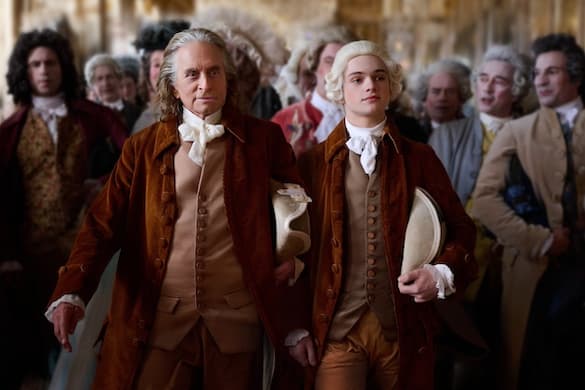Michael Douglas Entertains and Edifies as Benjamin Franklin in New Apple TV+ Series
The series mixes intrigue with humor. Similar to Ridley Scott’s recent ‘Napoleon,’ writers Kirk Ellis and Howard Korder and director Tim Van Patten employ levity to enliven what could come off as a history lesson.

A Renaissance man in the Age of Enlightenment, Benjamin Franklin was many things: scientist, inventor, honorary doctor, writer, printer, publisher, philosopher, revolutionary, and diplomat. It’s with this last guise that the new Apple TV+ limited series “Franklin” primarily concerns itself, though the renowned polymath’s other appellations also receive screen time.
The year is 1776 and Franklin arrives in France to enlist King Louis XVI and his councilors’ help in the Revolutionary War, which is not going well for the Americans. With him is his teenage grandson, William Temple Franklin, to provide assistance and support as the learned man is in his 70s and his commission will be fraught with difficulties.
Right from the start, as the pair land on the coast of Brittany, the series mixes intrigue with humor. Similar to Ridley Scott’s recent “Napoleon,” writers Kirk Ellis and Howard Korder and director Tim Van Patten employ levity to enliven what could come off as a history lesson. There are even jokes about flatulence, nodding to Franklin’s own essay on the subject.
The imagery, art direction, costuming, and makeup are other distinguishing elements; the show doesn’t rely on staid recreations of events but imbues them with figurative life. The over-the-top outfits and freakish makeup worn by the elites Franklin meets denote the aristocracy’s decadence — before it faces its own revolution. The grubby streets of Paris symbolize the country’s discontented citizens and ineffectual governance. The subtle use of reds, off-whites, and blues signifies the two countries at play. It all makes for a rich viewing experience on the small screen.
Based on Stacy Schiff’s prize-winning book, “A Great Improvisation: Franklin, France, and the Birth of America,” the program in its first three episodes, each of which has its premiere this Friday, tracks Benjamin and Temple as they attempt to infiltrate the king’s court at Versailles, while also meeting with members of the nobility who dabble in contraband and arms dealing. For the most part, the dialogue rings clever and carefully crafted, though the plotting often feels as “improvised” as Franklin’s mission.
A litany of historical figures is rushed before us, personages such as a fellow polymath, Pierre Beaumarchais; a French foreign minister, Charles Gravier, comte de Vergennes; and a young marquis de Lafayette. We are even given glimpses of the king and queen (Marie Antoinette).
Each of the first three episodes begins with a dramatic occurrence, then settles into a casual pace with only a soupçon of urgency, which aligns with how Franklin views diplomacy: not as a siege but a seduction. Michael Douglas certainly seduces in his portrayal of Franklin.
The actor’s modern cadence adds to the show’s new world meets old theme; his eloquent eyes impart patience, impatience, and wisdom; and, from certain angles, he even looks like the famous man on the $100 bill. It’s a great, knowing performance so far, with one anticipating even more from the actor in coming episodes.
Romance enters the narrative, too, and this gives Mr. Douglas a chance to demonstrate his “ladies’ man” charisma, as he’s done in many movies. The always appealing Ludivine Sagnier plays Franklin’s love interest, and though the actors are more than 30 years apart — like their historical counterparts — the two develop a plausible, courtly affection.
While the first two episodes contain powerful individual scenes, it’s in the third episode that “Franklin” begins to breathe as a period piece and its central characters show deeper characteristics. An argument between Benjamin and Temple exposes a rift between the two, particularly as Temple’s father (Benjamin’s son) is in prison back in America for his Loyalist allegiance. Young actor Noah Jupe depicts Temple’s incipient maturity and muddled emotions persuasively.
There’s even a sequence in this third episode in which Benjamin interacts with Chevalier d’Éon, a real-life transgender noble. Rather than feeling forced into the story for contemporary relevance, these scenes are in keeping with the era’s (and the show’s) discourse on freedom and liberty.
Although Benjamin Franklin’s experiments in electricity made him a celebrity in France, it’s his aptitude with epigrams and the printed word that brings him closer to achieving his ambassadorial goals, while simultaneously piquing powerful forces. Mouchards and British agents are everywhere, and it’s clear that danger will only increase as he attempts to secure an alliance with France.
Having filmed at Versailles, the creative team will no doubt enchant with views of the wondrous palace and its vast grounds in subsequent episodes. It seems fair to expect that they’ll also entertain as they edify.

